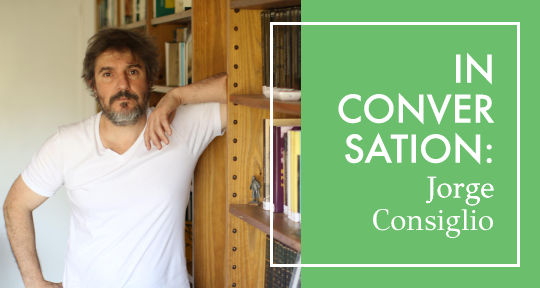Jorge Consiglio’s novel Fate (Charco Press, 2021) charts a tangle of crossroads, both literal and figurative. A taxidermist, an oboist, and a meteorologist do their best to direct their destinies against the background of Buenos Aires’s frenetic streets. Their worlds tilt and collide, and the sum of their experiences poses an eternal question about whether our everyday lives—and the incidents that jolt us out of them—are the work of fate or chance. Here, Asymptote Assistant Blog Editor Allison Braden talks with Consiglio about how a befuddled immigrant, a surfeit of street names, and a relentless colony of ants propel the plot, and why English—and Charco Press—was the perfect home away from home for the Argentinian author’s fifth award-winning novel. This interview, translated from Spanish, has been edited and condensed for clarity.
Allison Braden (AB): You begin Fate with an author’s note that explains your central question: “fate or chance?” What was it about this novel that inspired you to include the preface? How do you think the note shapes readers’ experience of the story?
Jorge Consiglio (JC): I included the preface at the suggestion of Charco Press. The introduction is part of the collection’s design, and I was delighted at the suggestion. In Argentina, there used to be excellent publisher called Centro Editor de América Latina which had a collection that used the same idea. I remember I used to buy the CEAL books and always enjoyed reading the author’s reflections. They were useful for situating myself within the context in which the work had been produced, and it offered a window into the author’s aesthetics and point of view. It felt like I was allowed to attend the rehearsals before seeing a play. I think in this case, in addition to that, Charco Press takes care to allow the authors to introduce themselves in their own words in countries where readers probably have never heard of them. That’s a big plus.
AB: Philosophers have grappled with the question of fate versus chance for millennia, and they’ve proposed various approaches for dealing with the vicissitudes of an unpredictable life. (The Stoics’ recommendation to face everyday frustrations and furies with grace and patience certainly would have benefited a couple of the short-tempered characters in Fate.) How did philosophy shape your approach to the novel’s central theme?
JC: When I was struck with the idea to write Fate, I didn’t think about philosophy or anything like it. What came to me first was a scene in which two characters whose destinies had been tapping on each other missed the chance to exchange a glance of recognition only by a few seconds. That was the trigger for the text, but as I made progress in the writing, I suspect because of the evolution of the plot, I was presented with the question of fate versus chance. I’m not the first to arrive at this question, of course. There were—and are—many writers who create their fiction out of this counterpoint. I guess it’s inevitable that, by dint of our ephemeral nature, we’ll stumble into these existential issues at some point. It’s true that philosophy seeks to reflect on the vicissitudes of the unpredictable. Religion and magical thinking, too. The characters in Fate aren’t thinking about these questions. They act without much reflection, but the plot development, like a poor imitation of life, embodies these questions that will never be resolved.


